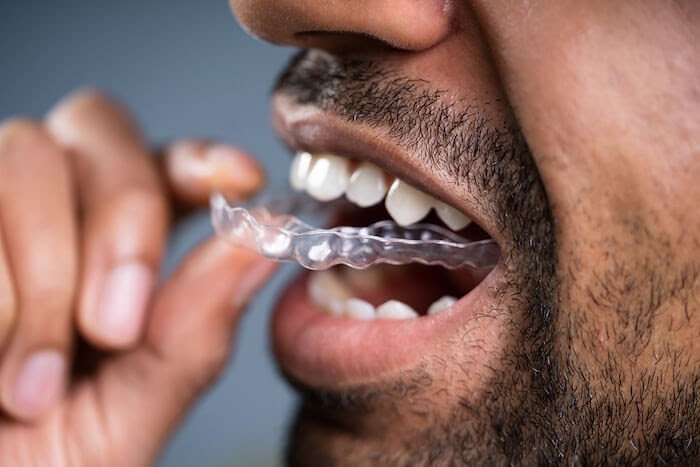How to know if your retainer doesn’t fit?
The best way to determine if your retainer is no longer fitting properly is to schedule an appointment with your dentist. At this appointment, they can examine your teeth and see if any adjustments need to be made. If you find that your jaw has moved, or that one side of your mouth feels different than the other side when you wear a retainer, these are signs that it may not be fitting correctly anymore. In these cases, it’s best to get a new one. So, let’s discuss further how to know if your retainer doesn’t fit:
Your retainers are not fitting comfortably
If your retainer is not comfortable, it will not be worn. Factors that determine whether a retainer fits comfortably include:
- The size of the retainer.
- How it is positioned in your mouth, such as how far back on your teeth it sits and whether it has been fitted for more or less room for movement in the jaw.
- How your teeth are positioned with respect to one another and other dental structures (such as fillings), which can lead to pain from rubbing against adjacent teeth or other parts of the mouth.
You have sore spots in your mouth
The most obvious sign of a retainer that doesn’t fit well is the presence of sore spots in the mouth. Soreness can be caused by any number of factors, including:
- An infection or irritation of the gums
- Allergies to certain materials used in making retainers (such as nickel)
- Tooth decay under a tooth being treated by orthodontics, which can cause pain and sensitivity.
You notice that your teeth are shifting
If you feel like your teeth are moving, then you should see a dentist to check if it’s due to your retainer. If so, the dentist will help you get a new one that fits better.
Your gums are swollen or bleeding
If your gums are swollen or bleeding, it is time to get a new retainer. If you do not get a new retainer, your teeth will shift and you will need braces. Braces cost a lot of money and you don’t want to spend that money on something that could be avoided by simply getting a new retainer.
You have difficulty breathing with your retainer
If you have difficulty breathing while wearing your retainer, it could mean that:
- You are not getting enough oxygen.
- You are not getting enough sleep.
- You are not getting enough exercise.
- Your diet is unhealthy or you do not drink enough water (this can cause swelling).
Your bite feels off
If your bite feels off, you may need to get a new retainer. Hold a mirror in front of you and look at your teeth. If they are crooked, it means that your retainer is not fitting properly. Your bite should be even and not be crooked because this could cause other dental problems with future wearings.
If this is the case, see if your orthodontist can adjust the wire on the retainer so that it fits better in place or try another style of retainer altogether.
Your speech is affected by your retainer
Speech problems can be caused by:
- Retainers that are too tight or loose.
- Improperly fitted retainers. If your retainer is not fitting properly, it could cause speech issues to occur. Your dentist will be able to determine if there is something wrong with your retainers and fix them before they start causing trouble with your speech!
Your retainer makes it hard for you to close your mouth
- Your retainer is too big. Your retainer may be too big if it makes it hard for you to close your mouth.
- Your retainer is not the right shape. If, when you wear your retainer and try to bite down on anything, it feels like your teeth are touching each other, even a little bit—even when they shouldn’t be touching at all—then your retainer is probably not the right shape for you!
- The material of your retainer is too hard or soft for you. Some materials can hurt more than others if they aren’t adjusted properly (for example: acrylics tend to be harder than thermoplastics). And some materials are softer than others (for example: some thermoplastics can break easily). So if this happens to you, talk with your doctor about what might work better instead!
Your retainers are causing a lot of pain and discomfort
If you are experiencing pain in your mouth when wearing retainers, this could be a sign of two problems. The first is an infection. Retainers can get dirty and harbor bacteria that causes an infection when they are worn over long periods of time. If you suspect that your retainer’s hygiene is a problem, it’s best to see a doctor immediately for treatment or to have them replaced.
The second possible cause of discomfort from the retainers is an allergic reaction to the material used to create them. Some people are allergic to certain types of plastic or rubber, which may cause inflammation or other problems if they come into contact with the teeth and gums for extended periods of time each day. If this seems like it might be true in your case, try contacting your dentist as soon as possible so he or she can prescribe some medication that will help alleviate any pain or irritation caused by wearing retainers too much!
When any of the above happens then its time to get a new one
If you’re still skeptical and you want another opinion, ask your dentist if they’ll look at your retainer and see what they think. If not, find a new dentist!
There are many other options available if none of these work: get a new mouth (we can help with that), get a new life (not sure how but we’ve heard it’s possible), or just hold onto that old retainer until it melts in your mouth while eating radioactive ice cream from Dubai in 2019 when we all die from radiation exposure during World War III between Russia & China over disputed islands in the South China Sea (or something like that).
Conclusion: how to know if your retainer doesn’t fit?
Even if none of these symptoms are present, it’s still a good idea to bring your retainer back in for an adjustment. The longer you wear your retainer, the more likely it is that adjustments will be needed over time as well.

